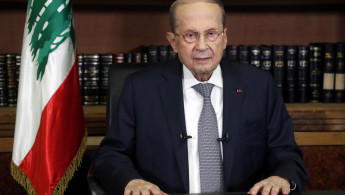Lebanon's Aoun rejects March date for legislative elections
Lebanese President Michel Aoun said he will refuse to sign a decree to hold legislative elections in March, adding to doubts over when a vote can be held amid the country's worst economic and political crisis, a Lebanese newspaper reported on Friday.
Aoun told Lebanese daily Al-Akhbar that the March date set for elections, which was approved by parliament in October, would "deprive" thousands of voters from reaching the voting age of 21.
Snowy weather in March would also mean voters "could face difficulties" reaching polling stations through blocked mountain roads, he said.
The planned March 27 election date would also give Prime Minister Najib Mikati's government even less time to try to secure an IMF recovery plan.
"I will not agree to legislative elections except on one of two dates, May 8 or May 15," Aoun was quoted as saying by the paper.
Aoun had previously refused to sign a law passed by parliament bringing forward the election to March and sent it back to the legislature, which once again adopted it.
Gebran Bassil, the leader of Aoun's Free Patriotic Movement (FPM), who is also the president's son-in-law, withdrew the FPM's lawmakers from the October parliamentary session which approved the law for the second time.
The FPM this week presented a legal complaint to the constitutional council disputing the date of the election and the proposed election law.
Lebanon's financial crisis, which the World Bank labelled one of the deepest depressions of modern history, has been compounded by political deadlock and a row over the probe into last year's Beirut port blast that killed more than 200 people.
The currency has lost 90% of its value and three-quarters of the population have been driven into poverty. Shortages of basic goods such as fuel and medicines have made daily life a struggle.





 Follow the Middle East's top stories in English at The New Arab on Google News
Follow the Middle East's top stories in English at The New Arab on Google News
![The UAE is widely suspected of arming the RSF militia [Getty]](/sites/default/files/styles/image_330x185/public/2024-11/GettyImages-472529908.jpg?h=69f2b9d0&itok=Yauw3YTG)
![Netanyahu furiously denounced the ICC [Getty]](/sites/default/files/styles/image_330x185/public/2024-11/GettyImages-2169352575.jpg?h=199d8c1f&itok=-vRiruf5)
![Both Hamas and the Palestinian Authority welcomed the ICC arrest warrants [Getty]](/sites/default/files/styles/image_330x185/public/2024-11/GettyImages-2178351173.jpg?h=199d8c1f&itok=TV858iVg)